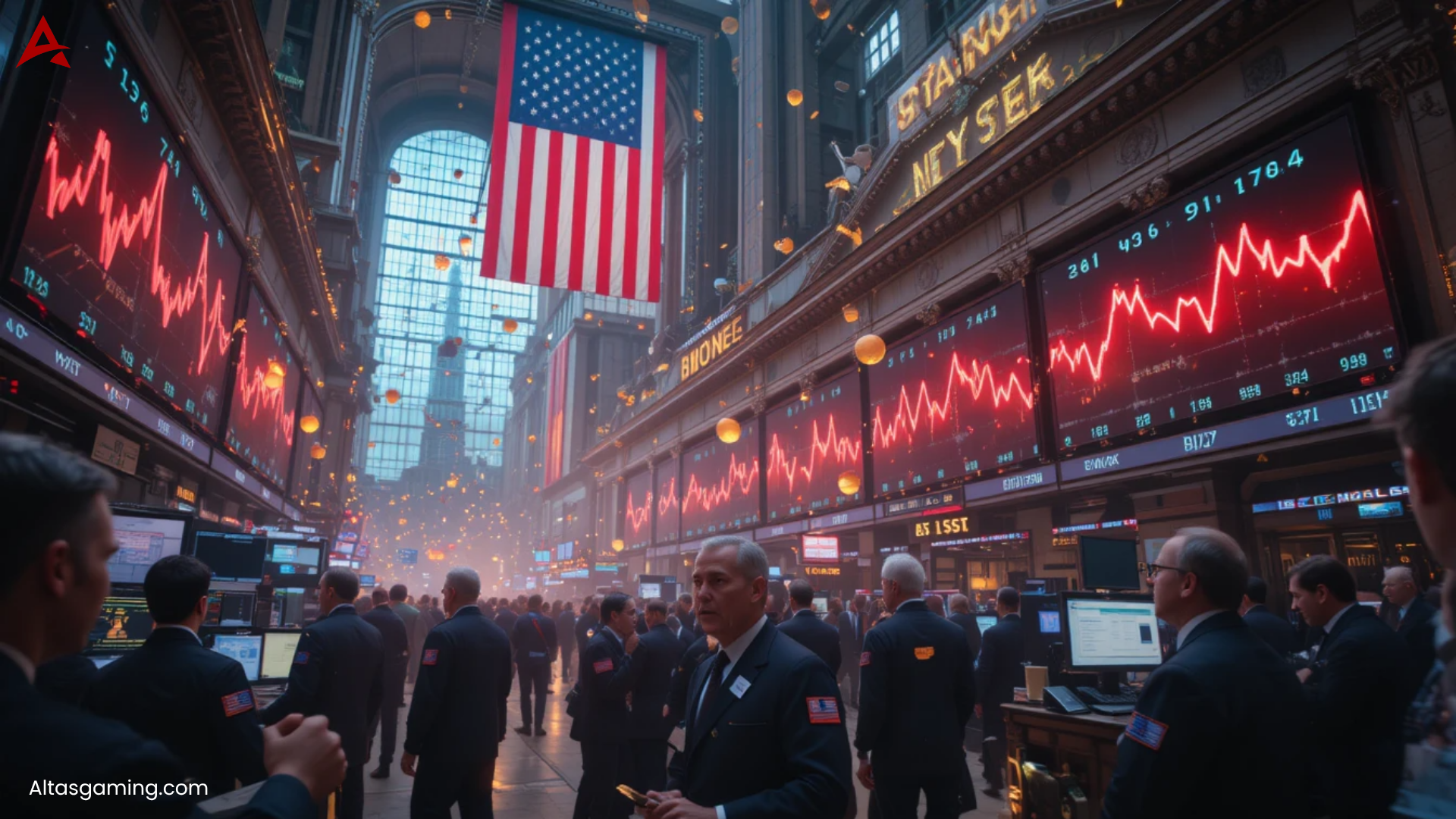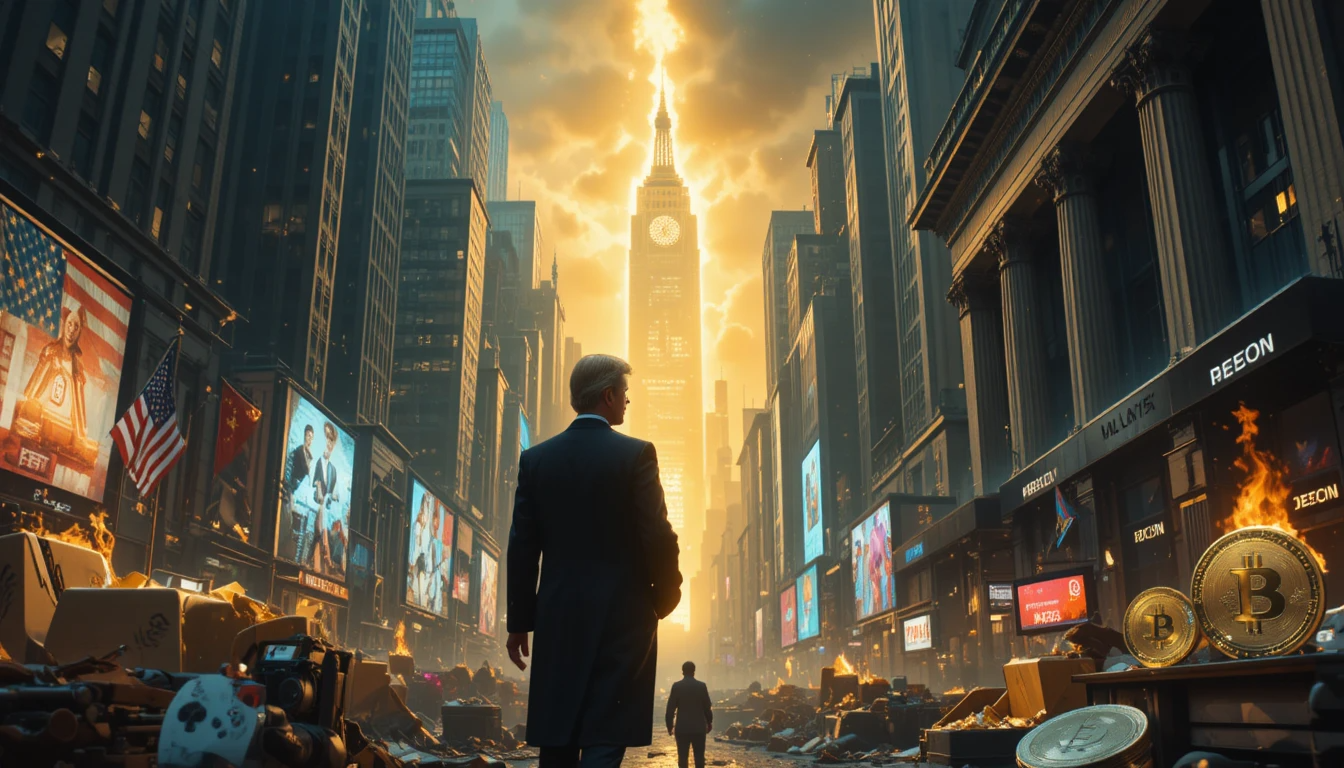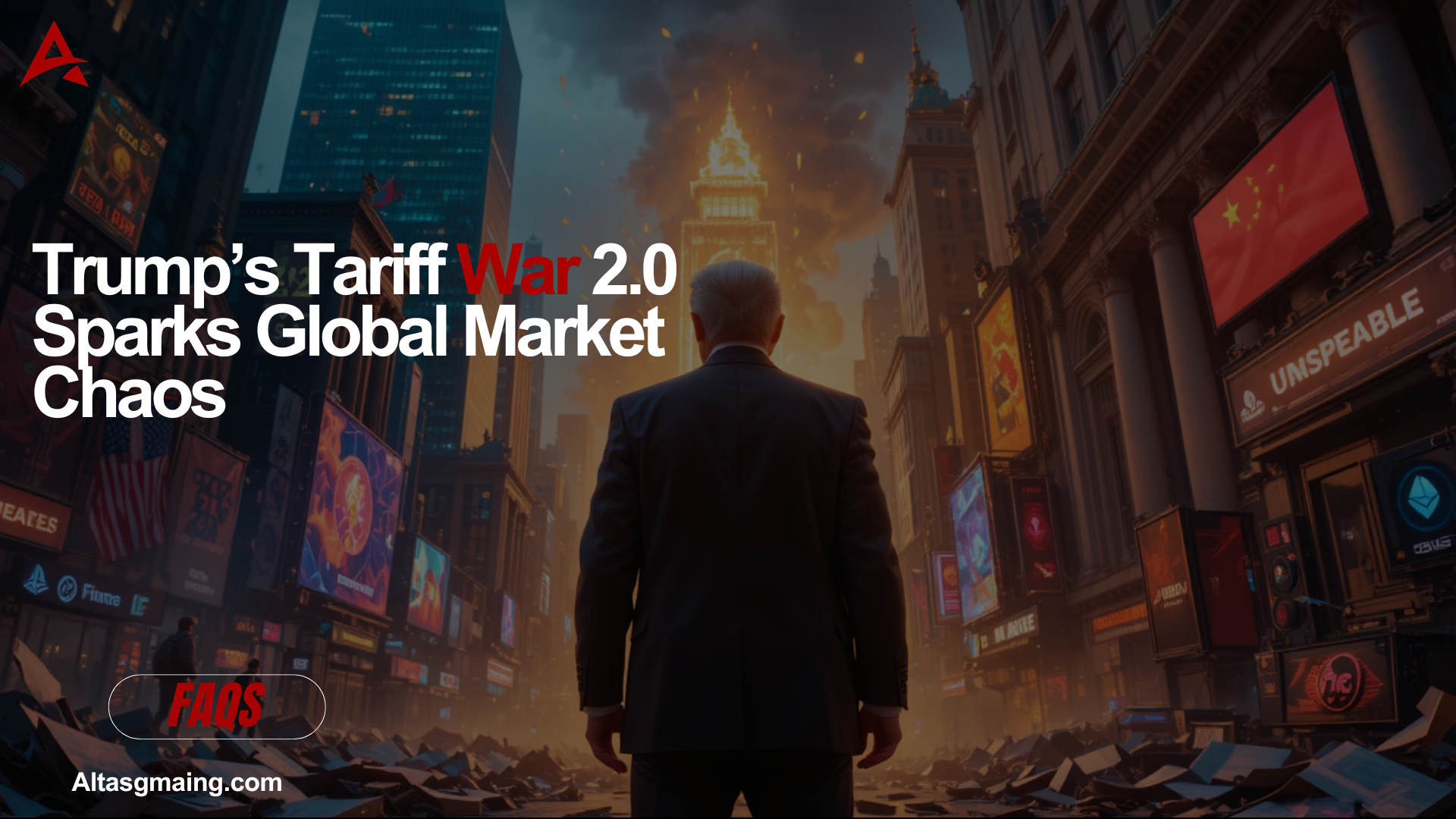🎮 Trump’s Tariff War 2.0 Sparks Global Market Chaos: How Gold, Crypto, and Wall Street Are Reshaping the Gaming Industry”
1️⃣ The U.S. Market in 2025 Turbulence Returns Under Trump’s Economic Policies
A. Trump’s Tariff War 2.0
Since Donald Trump’s return to the White House, the U.S. has reignited tariff tensions with China, Mexico, and the European Union.
- A 60% blanket tariff on Chinese imports and 10% on all other goods has sparked retaliation and raised fears of a new global trade war.
- Tech, electronics, and semiconductor industries which supply GPUs, consoles, and PC components are among the hardest hit.
- Gaming hardware companies like Sony, Microsoft, NVIDIA, and AMD now face rising import costs, leading to higher retail prices for consumers.
📊 According to The Guardian, Trump’s tariffs could add up to $1,200 per household per year in costs, directly affecting electronics and gaming products.
B. Impact on Wall Street
The S&P 500 and NASDAQ are volatile, swinging between AI-driven optimism and tariff-driven fears.
- The “Fear Index” (VIX) hit a 6-month high, showing market anxiety over trade disruptions.
- Major U.S. tech firms like Microsoft, Meta, and NVIDIA the same giants fueling the gaming ecosystem face investor uncertainty.
- Analysts warn of a potential “tech bubble correction”, with AI and gaming stocks overvalued.
C. U.S. Fiscal Pressure & Shutdown Risks
Government shutdown debates and spending cuts continue to weigh on investor confidence. A prolonged shutdown could cost $15 billion per week to the U.S. economy slowing public investment in tech and R&D.
2️⃣ Gold (XAU/USD) and Crypto — The New Financial Safe Havens
Gold’s Meteoric Rise
With global uncertainty, investors are flocking to gold.
- Gold prices (XAU/USD) are hovering around $4,200–$4,500, an all-time high.
- Central banks and private investors are hoarding bullion amid fears of trade wars and inflation.
- For gamers, this means higher hardware costs, since gold is a critical material in circuit boards, GPUs, and consoles.
Crypto’s Regulatory Chaos
Crypto is seeing another round of turbulence:
- Bitcoin remains near $68,000–$70,000, but regulation is tightening.
- New U.S. crypto laws under Trump’s administration focus on taxation and anti-money-laundering, limiting speculative trading.
- Meanwhile, gold-backed stablecoins (like PAXG and XAUT) are becoming popular safe-haven digital assets.
💡 Crypto and gaming crossover: Blockchain-based games and NFT markets are under scrutiny, leading some developers to move projects offshore.

3️⃣ How All This Impacts the Global Gaming Industry
A. Hardware Prices Surge
Trump’s tariffs on tech imports directly affect:
- Consoles: PlayStation, Xbox, and Nintendo consoles made in Asia face 10–25% price hikes.
- PC Components: GPUs and CPUs from NVIDIA, AMD, and Intel are costlier, reducing affordability for gaming PCs.
- Accessories: Controllers, headsets, and keyboards see similar cost pressures.
➡️ Result: Gamers may delay hardware upgrades, hurting PC and console sales.
B. Game Developers & Publishers React
Rising costs and global economic uncertainty have pushed major studios to cut spending or delay projects.
- Indie developers are turning to cloud streaming and mobile for cheaper distribution.
- Big studios like EA, Activision, and Ubisoft are focusing on service-based models (Battle Passes, subscriptions) to stabilize revenue.
C. Player Spending Trends
With inflation still elevated and wages flat, U.S. and European players are prioritizing discounted titles and subscription models (Game Pass, PlayStation Plus).
The Steam Summer Sale and Epic Store Deals are more critical than ever for keeping engagement up amid tighter budgets.
D. Supply Chain Breakdown
Tariffs and shipping costs have disrupted global logistics. Semiconductor shortages have re-emerged, slowing production of consoles and GPUs — echoing the early 2020s supply chain crisis.
4️⃣ International Effects — Gaming Beyond the U.S.
| Region | Impact |
|---|---|
| Europe | Higher import costs for consoles and GPUs due to tariffs; gold and crypto fluctuations impacting local currencies. |
| Asia | Chinese and Taiwanese component makers seek to avoid tariffs by shifting production to Vietnam and India. |
| Middle East & Africa | Currency volatility affects digital store pricing and microtransaction affordability. |
| Latin America | Inflation and tariff spillovers raise console prices by up to 25%. |
5️⃣ Connection Between Macro Markets & Gaming Trends
| Factor | Impact on Gaming |
|---|---|
| Gold Prices | Higher hardware production costs; GPU prices mirror gold surges. |
| Crypto Market | Blockchain games & NFT economies face regulation; stablecoins gain traction. |
| Stock Market Volatility | Gaming stocks fluctuate with tech valuation cycles. |
| Tariff Policies | Price hikes on consoles and accessories; slowed innovation in hardware. |
| Trump’s Fiscal Plan | Stronger dollar impacts international game prices and export revenues. |
6️⃣ Looking Ahead — What’s Next for the Gaming Industry?
- Short Term (2025-2026): Expect volatility in gaming hardware prices and fewer AAA releases as studios tighten budgets.
- Mid Term (2027-2028): Cloud and subscription-based gaming will dominate as players shift from hardware-heavy setups.
- Long Term (2030+): With AI and global decentralization, the gaming world could become its own self-sustaining digital economy — independent of national economic shocks.

7️⃣ FAQs — Gaming Meets Economics
Q1. How does Trump’s tariff war affect gamers directly?
A: It raises the price of consoles, GPUs, and accessories since most are imported from Asia. Retailers pass on the higher costs to consumers.
Q2. Why is gold so important to the gaming industry?
A: Gold is used in every console, GPU, and PC motherboard. When gold prices rise, production costs follow — leading to price hikes in gaming hardware.
Q3. Will the crypto market crash affect blockchain games?
A: Yes. Regulatory pressure and volatility make it harder for studios to sustain token-based economies, causing some blockchain games to shut down or relocate offshore.
Q4. Is the gaming industry recession-proof?
A: Partly. While gaming remains popular, big-budget titles and hardware sales often dip during economic slowdowns.
Q5. Could Trump’s policies change global gaming forever?
A: Absolutely. His tariffs and fiscal agenda influence manufacturing, pricing, and even innovation. Studios may shift production out of China and rethink game monetization models.
8️⃣ Final Thoughts
From Washington’s trade wars to Wall Street’s volatility, the economic domino effect reaches all the way to your gaming desk.
The Trump tariff revival, gold rush, and crypto regulation are reshaping not just markets — but the entire digital entertainment landscape.
As the global economy adjusts, gamers, developers, and investors must adapt:
- Expect higher costs.
- Watch for cross-platform deals.
- And most importantly, understand that the future of gaming is no longer isolated from real-world economics — it’s deeply entangled with it.
Table of Contents
- Global Markets on Edge- Tech Selloff, Fed Fears, and Iran Tensions Shake Investors-“But Opportunities Are Emerging. (Feb 2026)
- Milano Cortina 2026 Opens With Stunning and With Historic Opening Ceremony- But Critics Question Costs, Climate Impact or as the World Faces Division
- IRS Tax Refund 2026- Bigger Payments Coming for Some, but Delays Loom as Staffing Crisis Deepens
- Marvel’s Wolverine Has Massive Hype – But! Can Insomniac Really Deliver Its Darkest Game Yet? (Feb 2026)
- Fallout Countdown Falls Flat – “This Wasn’t What We Expected’ Fallout Countdown Backlash Erupts Online (Feb 2026)


Leave a Reply